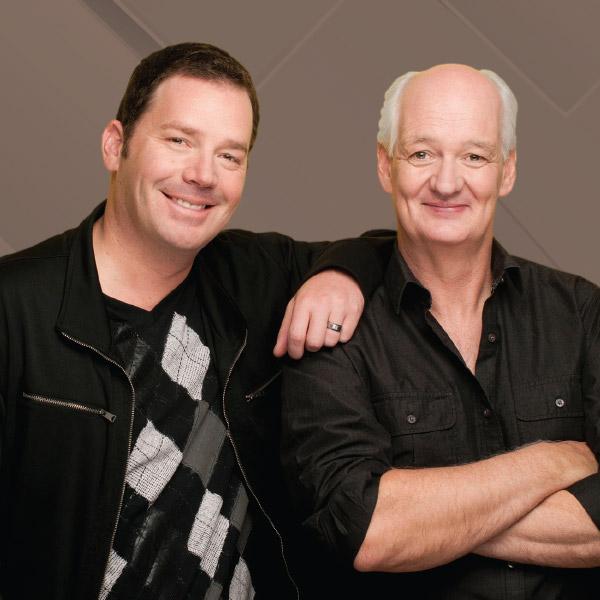Originally published in the Journal Inquirer
By Kristen J. Tsetsi
 Improvisational comedians Colin Mochrie and Brad Sherwood are probably best known for their split-second reactions to unexpected prompts in the recently renewed show now airing on CW, “Whose Line Is It Anyway?”
Improvisational comedians Colin Mochrie and Brad Sherwood are probably best known for their split-second reactions to unexpected prompts in the recently renewed show now airing on CW, “Whose Line Is It Anyway?”
The two have also performed as a two-man group for the last 10 years. On their website, Mochrie describes their show as “an evening of interactive comedy with big belly laughs supplied by improv icon Colin Mochrie and eye candy for the visually impaired by Brad Sherwood.” Sherwood calls it “the world’s funniest improv show, featuring the brilliant comic stylings of Brad Sherwood and his addle-brained sidekick, Colin Mochrie.”
Both men spoke with the JI by phone a few weeks before appearing at the University of Connecticut’s Jorgensen Center for the Performing Arts.
Q: You ask the audience to supply suggestions for your improv bits, including movie genres and occupations for your characters. Do you ever get suggestions that are either too strange or too difficult to incorporate?
Colin Mochrie: We’re always trying to get suggestions from the audience that we’ve never had before. That’s probably the hardest thing we’ve found to do. When you ask “occupation,” you get maybe five of the same night after night. Brad and I found when we’re doing the show that the best part is when we’re off balance and everything is totally fresh. We try to get the audience to think outside of the box. Anything that’s even slightly off sort of inspires us.
It’s odd how in back to back shows you get suggestions that are very much the same, even if you ask in different ways. I guess it just depends on what’s happening at the moment. We were getting anime for a bit.
Brad Sherwood: You hope for the off-the-wall suggestions because you’ve never done them before.
Q: What’s it like performing in front of a larger audience of 1,000 or more versus the smaller audience of 300 to 400 people on the set of “Whose Line Is It Anyway?”?
Mochrie: We were just in Montreal, and the theater fit 500. It was a great stage, and it was almost three-quarters around us. So the audience members were almost on top of us, which is great because you feel like you can actually see everyone in the audience. In some ways smaller is better, but we’ve always had a great time with big audiences. Nothing like a giant roar from 2,000 people. But from a performance aspect, probably around 500 is a good size.
Sherwood: There’s not much difference, because once you start you’re so busy just trying to figure out what you’re going to do and make it funny that you’re just wanting to make the audience laugh. Whether in a TV studio with cameras and lights or a small crowd or a big theater, you’re using the same part of your panic brain. It’s really just comedy crisis control; the crisis is that we don’t know what we’re doing. We’re making it up. It’s kind of like MacGyver comedy: someone hands you a paperclip and a cup and says “Make a funny scene out of this.”
Q: Is it hard to find a good improv partner?
Mochrie: In theory it should be, but you can work with anyone who has learned to do improv. That said, there are certain people you immediately have a connection with. (“Whose Line” co-star)Ryan (Stiles) and I grew up together in Vancouver, and when we started working together it was like we’d worked together for years. Same with Brad. I’ve known him almost 25 years now, and when we first started working together it was great.
I’ve had some good friends I have trouble improving with. They’re funny people, I find them funny, but we just don’t connect on stage. It can be hard. With “Whose Line” we lucked out, I think. Everyone works well with everyone.
Sherwood: You should be able to work with anyone, but as an improviser it’s good to work with someone who can throw it to you as fast as you’re throwing it to them. I think you definitely establish chemistry, and you heighten levels of trust. It’s the difference between trust and other performing. This is a trust that you can continue to push each other, and to put each other into uncomfortable positions and get out of them. It’s like a martial art where you want to be off balance so you can make a great recovery.
Q: What is your favorite of the improv games you do on “Whose Line”?
Mochrie: One has consistently been introducing songs. We sit there, banter a bit, and make up songs for the singers to sing. We get to watch the amazing artistry of the song guys.
Sherwood: Sometimes I say my favorite is the one that by the end of the show ends up being funniest. I think the ones that scare me the most are the funniest. I’m an improv purist. Part of what we like is not knowing what’s going on. I like a lot of the music things. Colin and I do some rap music improv in our show, which is pretty funny for two old white guys. I like that one because our brains have to work as fast as possible to make sense, make it rhyme, and make it sound good. You’re not challenging yourself synapse-wise any faster than that.
Q: Your stage and TV shows are designed to make other people laugh. What makes you laugh?
Mochrie: People hurting themselves always makes me laugh. Somebody running into something. And I love Louis C.K. and “Arrested Development.”
When your life is comedy, to be able to sit back and enjoy it…a lot of times you’re kind of analyzing it. “Why was this funny?” “Why was that funny?” But those shows I just mentioned, I sort of forget that and can just enjoy them.
Sherwood: Colin and I both laugh when someone trips and falls. It’s the most base, monkey part of your brain that’s laughing at that stuff.
When I watch a really funny movie with friends, they’re laughing hysterically and I’m silently laughing and absorbing every moment. I tend to laugh more on the inside, because ever since I was young I always wanted to make people laugh, so as much as I love laughter, I absorb it internally and dissect it and go, “What was so funny about that?” My wife says to me, “You never laugh.” I am laughing, and I eat, breathe, and sleep comedy, but I absorb it in a different way.
It’s rude. I should probably start laughing more at my friends. They probably think I don’t think they’re funny.
Q: I understand that the extent of the preparation you do is try to come up with new game ideas now and then. Do you have any new games you’ll be playing on the Oct. 5 show, and do you have any advice or helpful tips for the audience?
Mochrie: I think we may have a new game called “Kick It.” Brad and I do a scene where if one of us says something the other thinks will be a good song, the other has to rap it.
Sherwood: There are no helpful tips. There’s nothing someone could do wrong, because whatever they do, good, bad, or indifferent, we’re going to turn it into something funny.
We’re not there to humiliate people on stage. Even if they say something embarrassing, we’re going to take it as a comedy nugget, but we’re not going to do it at their expense. It’s a safe environment.

Kristen Tsetsi is the author of the post-Roe v. Wade novel The Age of the Child, called “scathing social commentary” and “a novel for right now.” She is also the author of the novels The Year of Dan Palace and Pretty Much True (studied in Dr. Owen W. Gilman, Jr.’s The Hell of War Comes Home: Imaginative Texts from the Conflicts in Afghanistan and Iraq). Kristen’s interview series at JaneFriedman.com offers behind-the-scenes insights into all things writing and publishing.



